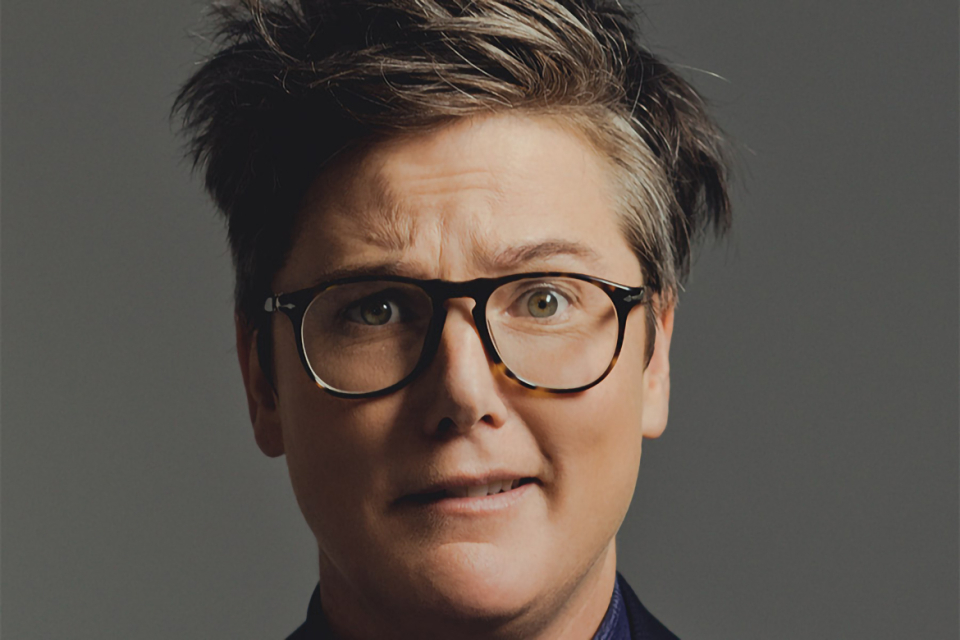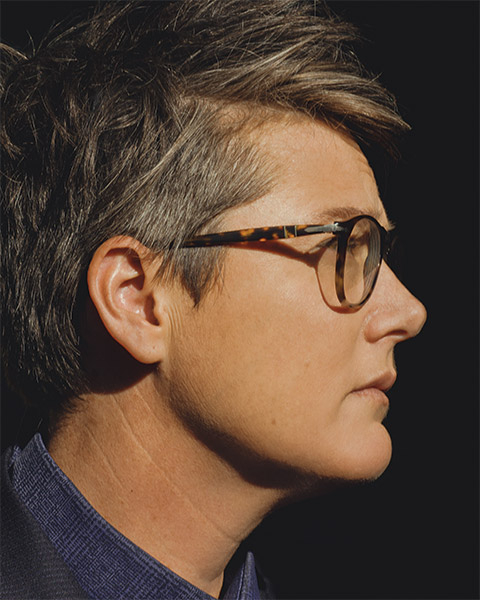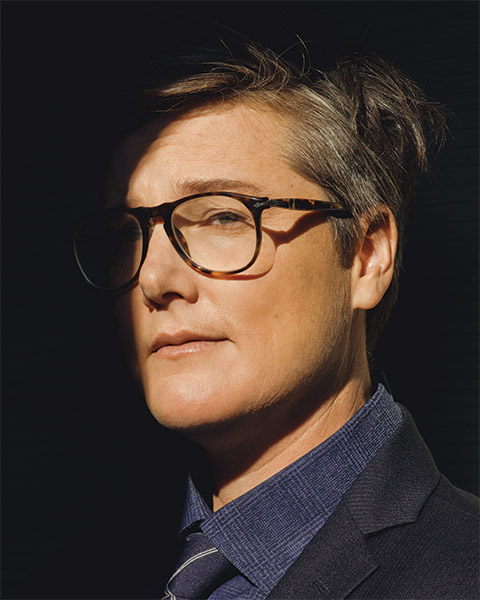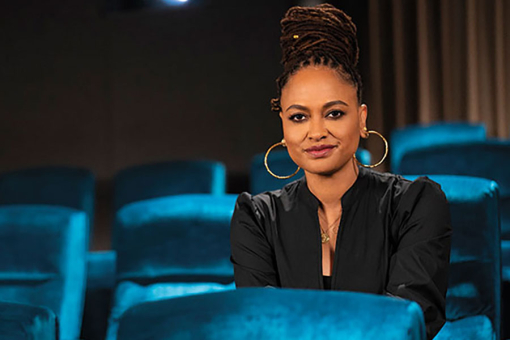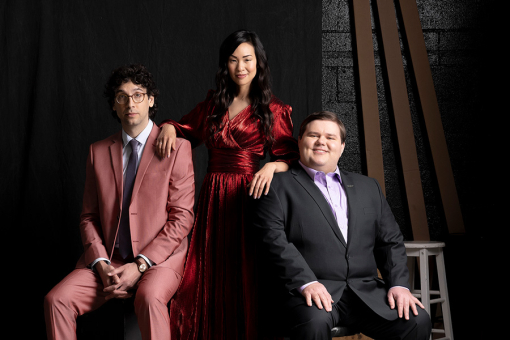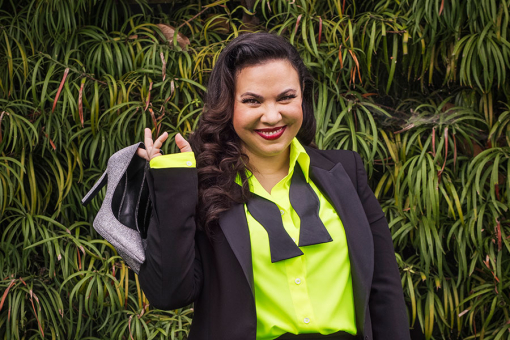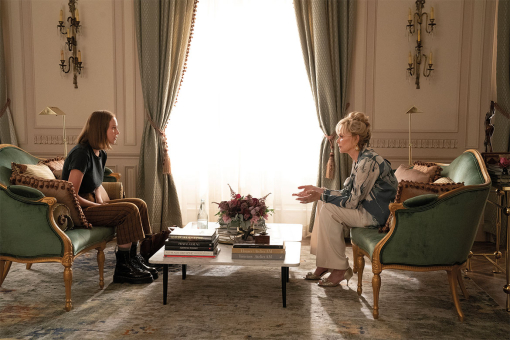You have to see Nanette.
As soon as Hannah Gadsby's stand-up special hit Netflix last June, it seemed as if everyone was writing, posting and, most remarkably in this digital age, talking about it.
A masterpiece of style, content, bravery and timing, it debuted as the #MeToo movement was gathering force. That was unintentional — Gadsby had been working on the material for years — but felt inevitable. "I'm very proud of it as a piece of work and all that," she says, "but I think the time that it landed in the world was also part of the effect that it had. It hit a nerve that needed to be hit at the moment."
While Netflix won't release numbers, the show has made Gadsby, a popular comic in Australia, sufficiently well-known on American shores to be invited to present an Emmy Award, satirized on Saturday Night Live and recognized on the street. In April, Nanette won a Peabody Award.
She's still wondering at the response. "I knew I had something, but I thought it would alienate more people than it did," she says. Meeting at a noisy café in West Hollywood, California, before eventually decamping to a quieter park down the block, Gadsby is reserved but wry, her answers thoughtful.
She never set out to film Nanette. It began as a live show, and it began much angrier. "I was willing to accept that I would greatly reduce my fan base, to the point where I lined up a job at my brother's fruit and veg shop, because comedy was killing me," she says.
She had nothing to lose. "Powerful people didn't give a shit whether I lived or died. That's what gave me the sneaking suspicion that I could get away with what I did, because of the fact that all my life I'd been told that I didn't matter to the world."
With that freedom, she began examining everything that was killing her: the toxicity of hatred toward women and LGBTQ people, toward those whom society could label "other" and denigrate with impunity — and how much of that was mirrored in the comedy world. She deconstructed her own self-deprecating humor and vowed that she was through with it.
For someone relegated to the margins of society, she says, "It's not humility, it's humiliation." From the stage, she tells the crowd that she was born and raised in the Australian island state of Tasmania but that, "I had to leave as soon as I found out I was a little bit lesbian," because homosexuality was a crime there until 1997.
She moved to the mainland at age 21 and earned a degree in art history. She uses that knowledge to great effect in the show when she identifies Picasso's misogyny for what it was: mental illness.
Along the way, she makes the audience howl with laughter. Considering that she's labeled a "lesbian comedian," she points out, "if you were to plot my week, not a lot of lesbian-ing gets done. I cook dinner way more than I lesbian, but nobody introduces me as 'that chef comedian,' do they?"Reflecting on the issue of identity, she almost sighs, "I identify as tired."
She then starts to dissect her own internalized homophobia and the harm it has caused her. She reveals the harm that others have inflicted. Shocking the audience into silence, Gadsby tells of assaults and rapes that nearly destroyed her — that were the reason her comedy couldn't continue on its previous blithe path. The final howl is hers.
The effect was overpowering. To her surprise, the nightly live shows started selling out; as word of mouth grew, she added dates and cities to a tour that ended up running for 18 months. The show changed constantly. Gadsby estimates she had about four hours of material to work with, so she kept swapping bits in and out at every stop.
And the last 15 minutes were different every night. "Because of what I was doing — the danger not just to myself but to the audience — I just figured that it would be irresponsible to phone it in," she explains. "If I was alive in it and I was feeling what was happening in the room, then I couldn't go too far. And I think that helped.
"It also meant that when I performed it, it was real. The pain I felt was real. I was reliving trauma every single night."
About eight months into the run, she was approached about filming the show as a special. Gadsby couldn't see how television could capture the effect of the live performance, she recalls, "because it was such an emotional mood in the room." Yet the special did capture that, and now she says, "It speaks to the power and intimacy of television, the potential of it, which I think is really exciting."
She credits director Madeleine Parry for translating the live experience to film so well.
Having seen an early live show in her hometown of Adelaide, Parry could attest to its impact, and she wanted to recreate that. "I wanted us to feel that we were there with her, or we could feel what it might be like to be the one onstage under the lights," Parry says, speaking by phone from Australia. Eschewing sweeping camera movements, she focused on Gadsby, and on the space between performer and audience.
"It so clearly worked," Gadsby says of Parry's choices. "That is what forces people into that discomfort I was putting into the room. People just had to sit in it. That decision was an exceptional piece of theater work." The show was filmed at the Sydney Opera House, a venue so massive, Gadsby says, that "the silence in there has its own noise. There was depth to the silence; you can feel that in the filming of it, so that was really cool."
The site also created a number of obstacles. Parry notes that the show was sold out, so there were limited places to set up the eight cameras. (Jon Olb also directed on the night of the shoot, contributing experience with multi-camera live shows.)
Other considerations came into play. "Hannah is incredibly sensitive," Parry relates, "and we had a chat really early on about how, if someone is crinkling a lolly wrapper at the back of the auditorium, she can hear it. If anyone checks their phone, she can see it and gets distracted.
"So having a camera onstage, or in her field of vision, was something that we worked really hard to avoid as much as possible, because yes, we want to capture the show, but for Hannah on a personal level — and for us as well — we want her to perform her best show ever. So the cameras were quite far away."
"I have autism," Gadsby explains. "I'm sensitive to sound. I wear noise-canceling headphones when I go out. Part of why stand-up works for me is that it's a way I can communicate and connect to people without being overwhelmed by sensory input."
The show is bookended with scenes of Gadsby at home with her dogs and curling up with a cup of tea. "I wanted people watching on the TV to know that the Opera House is not my natural habitat," she says, "so I didn't want that rock-star walk through the bowels of the building." For Parry, those domestic moments "set a tone that might subconsciously trigger that this show would be personal in a way."
Gadsby has been working on a memoir about the decade between her arrival on the Australian mainland and the beginning of her comedy career. She calls that time, roughly 1995 to 2005, her wilderness years.
"There's a lot of trauma in that time frame for me," she says. Trauma affects memory, so she's still putting the pieces together. (Ten Steps to Nanette is now available from the Australian publisher Allen & Unwin.)
She tried her hand at many jobs — knife sharpener, itinerant farmer, film projectionist — and then entered a comedy contest. "There was no reason for me to believe that doing comedy was going to work out any better than any of the other weird-ass ideas."
The comedy scene in Australia is defined less by the circuit and more by the annual Melbourne International Comedy Festival, she explains. "That's how I cut my teeth. I built up at least an hour of material every year for 10 years. There's only so many jokes that can carry an hour. You need stories. That's how I learned the craft of shaping a show to hold an audience's attention."
Gadsby appreciates the democratizing nature of stand-up. "I don't come from money, and I would never have got into theater or film or television proper, because I'm just not the right shape or energy level. I need to sit down. There's not many roles for me. Stand-up has taken those marginalized voices into the mainstream, historically and even more so now. It's a pretty exciting art form."
As for Nanette's format, she points out that, "by breaking the contract of expectation, essentially what I was doing was performance art, which has been around for a very long time. I don't assume that I'm doing anything different in that respect other than bottling it and sneaking it through the back door for a mainstream audience."
Gadsby holds hope for comedy's ability to reach people emotionally. "Drama and comedy always coexisted for a reason. It's to lighten what must be said."
She mentions some of her favorite comedians who do just that, including John Mulaney and Maria Bamford, and adds that she adores The Good Place, Michael Schur's NBC sitcom about what it means to be a decent person. "What television and stand-up comedy are doing right now is putting artistry into popular culture. And I love pop culture. I think it's always what we need — that's why it's popular."
Her own foray into series television was a similarly delightful Australian show called Please Like Me. Created by comedian Josh Thomas, who also starred as Josh, the show featured a number of fictional Josh's friends and family members, many of whom were played by actual Josh's real-life friends.
The series ran from 2013 to 2016. Lately, Thomas has been in Los Angeles working on a pilot. Speaking from the aisle of a Target, he recalls how he first became a fan of Gadsby's. "She came onto the scene out of nowhere. She was this gal from Tasmania doing her thing, and she was really funny. And we're both gay, and gay people like it when other people are gay."
They became friends when Gadsby asked him to join her on a five-day hike. The hike ended up on the show, in an episode featuring Josh and his mother. Gadsby ended up on the show as well, playing a depressed woman named Hannah.
Thomas describes his method: "I would do the story mostly, and she would do all the character's dialogue. The point of view of that character is Hannah Gadsby's point of view."
He didn't get a chance to see Nanette until it was on Netflix. "It was like watching someone being a master of their skills," he says, "and at the same time talking about something in the zeitgeist and having a really interesting, personal, unique perspective on it — like a perfect storm of all those things. She always does a really great show. But this had something a little bit magic about it."
The performances took a nightly toll on Gadsby, who has suffered from PTSD.
"As I was doing it, I felt like I was literally in the battlefield," she says. Nonetheless, she felt supported by a community as she told and retold her story, and since the show's end she has recovered from the condition. "I wouldn't recommend it as a course of treatment," she says drily. She's still analyzing the show's impact on her. And napping.
As for Nanette's impact on the industry, Gadsby is now going to the kinds of meetings she never imagined being invited to. "Hollywood ambitions weren't in my wheelhouse, so I'm living somebody else's dream."
She's staying in Los Angeles for the time being, taking her time before she makes her next move. "I'm from a different world; the reason I'm here is that this is where it's taken me, and so I need to read the room before I say anything. I'm sussing you guys out." While she susses, she's touring her new comedy show around the country. Called "Douglas," it's named after one of her dogs and will stream globally as a Netflix special next year.
Gadsby wants to be careful about what she puts out into the world, but not about her position in it. "The power dynamic's flipped," she says. "I have an enormous amount of power now, so it's incredibly important to me not to protect it. I don't know what I'm doing — this is all new. But what I create next can't be about maintaining this position. I never meant to be here in the first place."
This article originally appeared in emmy magazine, Issue No. 6, 2019

